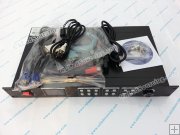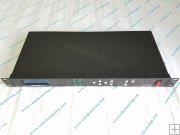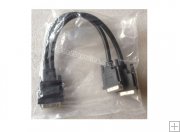Linsn Sending Card TS802
Linsn Sending Card TS802
Linsn sending card "TS802" is also called TS802D or SD802D, which is all same in functions. Now the TS802 series are being replaced for TS801 series. Please order accordingly.
Features:
The differences
between model 801 sending card and model 802 sending card:
Model801 can max support 1280*1024pixels.
Model802 can max support 2048*1152pixels.
Single card model 802 can control 2048*640pixels.
Model802 is added with the voice transmission and cascade
functions.
More features:
1. Completely Compatible with the Seventh Generation
Control System
The eighth generation is
developed based on the seventh. Compared with the seventh, the eighth has all
the functions of the seventh. Moreover, the eighth is more functional, more
powerful, more stable and more reliable.
2.
Supporting 210 colors
The seventh supports 28
colors: 28*28*28=16777216 kinds of colors.
The eighth
supports 210 colors: 210*210*210=1073741824 kinds of colors. It needs to work
with our video processors using the 30 bits TTL.
So
the coloring number of the eighth is 64 times as much as that of the
seventh.
3.
The intelligent connecting function
Without
resetting the configurations, the receiving cards (including spare ones) of the
same LED display/cabinet can be randomly exchanged or replaced, for they will
automatically recognize the showing area and content they are responsible
for.
4.
The intelligent supervision function
In each
receiving card, there is a temperature sensor and four fan-power-output-ports.
The speed of the fans is under wise controlled according to the warming value of
temperature set by users.
5.
Company Logo Showing
If the power of the
sending card is not turned on, the monitor the PC will automatically show the
preset company picture. The pixel of the picture will be 128*128, the coloring
number 16K.
6.
Supporting more scan mode
The seventh supports
1, 2, 4, 8, 16 scan mode, the eighth supports 1, 2, 3, 4, 5, 6, 7, 8, 9. 10, 11,
12, 13, 14, 15, 16 scan mode.
7.
Supporting more modules
The seventh supports
modules with the width: 2pixels, 4 pixels, 8 pixels, 16 pixels, 32 pixels, 64
pixels.
The eighth supports all the modules with
width within 64 pixels. That is from 1 pixel to 64 pixels.
8.
Supporting cut-up function
Each receiving card
max supports 1024 pieces cutup, for non-conventional type display or text
display use.
9.
Supporting empty pixel insert
The eighth can
be set to insert one or more empty pixels every X pixels. This function is
applying in non-conversional type display.
10.
Supporting PWM driver chip
Need to use
particular driver chip
Make the display effect going
perfect.
11.
Supporting hardware pixel by pixel correction
Need to use particular driver chip. By changing the
current for the LED, adjust the color, wave and brightness of the LED.
Make the effect of display pixel by pixel correction
better.
12.
Supporting pixel supervision function
Need to
use particular driver chip
Dynamically check the bad
pixels on the display.
13.
GigaTechnology
Veritable Giga technology. One
sending card can support the max pixels: Model701: 1280*1024; model702:
2048*640; two cards are cascaded: 2048*1152. Single network cable supports the
max pixels: model701: 1024*640, 1280*512; model702: 1600*400,
2048*320
14.
Pixel by Pixel Correction and Unit box by Unit box Correction Function
Pixel by pixel correction supports four kinds of
correction modes: single pixel, 2*2pixels, 4*4 pixels, 8*8 pixels; and the max
correction is 6144 pixels/module, and brightness 256 levels for red, green,
blue. Every unit box correction is used to adjust the chromatism among every
unit box; and brightness 256 levels for red, green, blue.
15.
Intelligent Identification Function
The
intelligent identification program can recognize every kind of scanning mode and
every type of signal trend of all kinds of double-color, full-color (real pixel
and virtual pixel) drive boards, and the accuracy rate is 99%.
16.
Gray level 0---Gray Level 66536 (64K) are Optional
Users can adjust the gray level from 0 to 66536
levels according to requirement of displays, making the display achieve the most
desirable effects.
17.
Optional Refresh Frequency, Synchronous function
Refresh frequency are adjustable from 10HZ to
3000HZ, and the refresh frequency and phase-lock function can make the display
refresh locked at integral multiple of that of computer display, avoiding the
image to been torn, and ensuring the image to be perfect. The phase-lock
synchronous range is from 47HZ to 76HZ.
18.
Super loading capacity
Full-color receiving
card with gray level 4096 (Model 4K) and refresh frequency 180HZ can support
512*128; full-color receiving card (model 16K, only for static) with gray level
16384 and refresh frequency 300HZ can control 160*64,.(Remarks: the drive board
must realize high frequency 30MHZ)
19.
Double network cables switch automatically
The
A and B ports of the receiving card can be both used as input ports or output
ports. Users can adapt two computers to control a display at the same time, when
one is out of order, the other will replace it automatically; Users can also use
one computer with double network cables to control a display, when one is out of
order, the other will take place of it automatically, making the display work
normally all time.
20.
Multi-display synchronous and combination functions.
Supporting one sending card to control
multi-display, and the multi-display can be willful combination, synchronous
display, and independent play.
21.
Brightness 256 Levels Automatic Regulation
The function of brightness 256 levels automatic
regulation can make the display brightness regulation more efficient.
22.
Voice Transmission Function
Model 702
integrates the voice transmission, and requires no audio cable to transmit audio
signals to the display. Double 24bits and 64KHZ hi-fi digital analogy and
modulus switch to transmit the voice, making display achieve the perfect video
effect.
23.
Upgrading Program Online
If program of
receiving card needs to be upgraded, just open the display power, and upgrade it
through Led Studio, no need to remove the receiving card from the
display.
24.
No Toggle Switch
No toggle switches on the
receiving card, all the setups are set through Led Studio.
25.
Test Function
Receiving card has the test
function, no sending card needed; can test the display directly, such as bias,
gray level, red, green, blue, etc. many kinds of test modes.
26.
Super Long Transmission Distance
The max
transmission distance is 170M (actual measure); normal transmission distance is
140M.
27.
Matching software
Led Studio V9.0 or above.
















